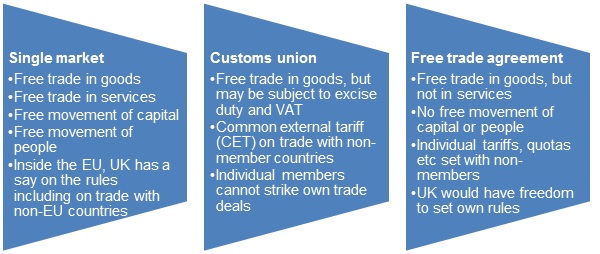Brexit briefing: Single market access, customs union or free trade agreement: What is the difference?
Single market access, customs union or free trade agreement
The UK government is considering what trading relationship it should seek to negotiate with the European Union (EU) following an EU exit. There are a number of options including seeking to stay, (or potentially pay) for access to the single market, to participate in the EU’s custom union, or to seek a free trade agreement with the EU.[1]
The EU customs union operates alongside the EU’s single market and free trade area. Remaining in a customs union, is an attractive option to some, because it mostly does away with barriers to trade in goods (but excise duty and VAT may still apply), simplifying trade between the member countries involved, and puts in place a common set of rules on trade with third countries, i.e. those outside of the customs union.
However, many businesses that provide financial and professional services from London see access to the single market as vital to their future success. The single market removes barriers to trade and other regulatory obstacles, and harmonises national rules at EU level. A comprehensive deal on services trade requires a single set of rules which includes freedom of movement of people and capital. Presently, there are no comprehensive free trade arrangements in place between major countries anywhere in the world for services.[2]
Options for the UK
The UK Government has not yet decided whether the UK should seek to remain within the EU customs union. Liam Fox MP, the International Trade Secretary, has called for the UK to leave the customs union to enable it to strike trade deals with third countries. But Philip Hammond MP, Chancellor of the Exchequer, has warned that leaving the customs union would saddle companies with form-filling, delays and frontier checks, and will require a new north-south border in Ireland.
Norway is cited as a possible model on which a future EU/UK relationship could be based. Norway is a member of the EEA, has access to the single market (except for fishing and agriculture), but is not in the EU customs union. In return for single market access Norway is obliged to pay into the EU budget, accept freedom of movement, and abide by EU regulations, but is unable to influence the latter.
If the UK left the customs union it could introduce a customs border with the EU similar to the one that exists between Norway and the EU. But this is likely to be bureaucratic and costly. Treasury analysis[3] has already identified the economic losses to the UK of staying in the EEA like Norway.[4] The UK is also likely to feel the costs more as its economy has complex industries with deeply integrated cross-border supply chains.
The UK could leave the customs union but seek to ensure that industries with complex supply chains, such as car manufacturing, are exempt from tariffs on cars traded between the EU and the UK, to guarantee cross-border trade. But to do this, the UK would need agreement from the EU. This is likely to cause two problems: firstly, the EU is unlikely to allow the UK to pick favoured sectors to stay in; and, secondly, the agreement is likely to fall foul of the World Trade Organisation’s most-favoured nation rules.[5] According to John Springford, of the Centre for European Reform:
“If the EU and the UK make trade in cars tariff-free with each other, they must eliminate tariffs on cars for all countries. The only way around this is to sign a trade agreement that covers the majority of goods sectors.”
The agreement reached with Nissan would appear to suggest the UK will try to negotiate EU access for certain sectors. But to achieve this, the government would presumably have to offer compensation for tariffs which could breach EU rules around state aid.[6] Other car manufacturers too are likely to want similar deals. Honda, Toyota and Vauxhall all operate plants in the UK that are heavily reliant on exports to the EU, while Ford and BMW make engines that are assembled into vehicles in continental plants. And other sectors, for example, financial services, have called for special deals.[7]
While sectoral deals are possible, the costs could be too great. Mujtaba Rahman of the Eurasia group, a political risk consultancy, says the other 27 EU countries are clearer than ever on the indivisibility of the single market’s “four freedoms” of movement of goods, services, capital and labour. The international trade minister, Rt. Hon Greg Hands MP, recently indicated that the UK could seek a deal which would allow sections of the economy to remain within the EU’s customs union following an EU exit.[8]
[1] A customs union is an agreement between two or more countries, to share common external trade relations with third countries
[2] NIESR (National Institute of Social and Economic Research) explanatory video
[3] HM Treasury analysis, April 2016
[4] The European Economic Area (EEA) consists of the 28 EU Member States and the three EEA EFTA States (Iceland, Liechtenstein, and Norway).
[5] Most-favoured-nation (MFN): treating other people equally – Under the WTO agreements, countries cannot normally discriminate between their trading partners. If a special favour is granted to one (such as a lower customs duty rate for one of their products) then the same must be done for all other WTO members.
[6] State aid is any advantage granted by public authorities through state resources on a selective basis to any organisations that could potentially distort competition and trade in the EU.
[7] Financial Times, August 2016

